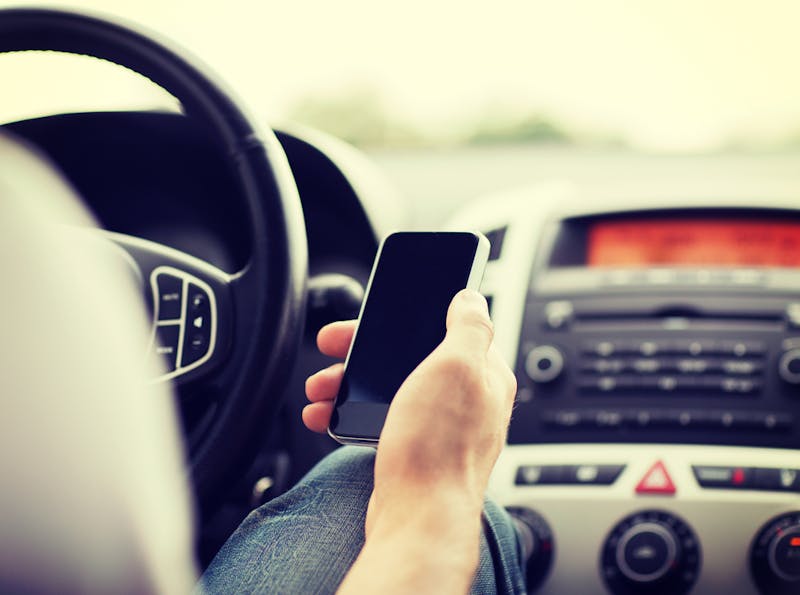
You are approaching a traffic light that has already turned red, so you gradually slow your vehicle down. As you do so, you grab your phone, which went off while you were approaching the light, to see who texted you and what they said. As soon as you pick up the phone, you immediately feel a sharp impact to the back of your car. You can tell someone hit your car from behind, with agonizing pain immediately shooting through your back and your forehead slamming into the steering wheel as you are pitched forward by the momentum of the other car crashing into yours. This is your third accident in which you were texting at some point either immediately prior to or around the time of your accident, but this time you were not at fault in causing the accident, unlike the other two accidents on your driving record. The police officer that responds to the scene assesses the motorist who rear-ended you to be at fault in following too closely at too high a speed and not safely coming to a stop when the driver in front of him, you, came to a stop at a red light just like you were supposed to do.
However, if you were involved in a motor vehicle accident that is someone else’s fault, then this likely is simply a red herring that distracts from the ultimate issue: the motorist at fault was not following at a safe distance and caused the accident as well as your injuries. The defense may think they have struck gold because you were involved in several prior accidents in which you were texting shortly before the accident and you were picking up your phone to read a text message shortly before this accident occurred. However, this “gold mine” often falls short of producing the result the defense may intend, first because it is a long shot that your driving record will even come into evidence and, second, because, even if it does come into evidence, a jury will likely see this defense tactic for what it is: a bad attempt to play blame the victim. Juries do not like this, and will often completely tune out defendants or their lawyers who try to play these types of games.
Your Prior Driving Record Actually Has to Be Relevant to The Issues in the Current Case
For any evidence to be admitted at trial (i.e. to be presented to a jury), the judge first must determine if it is relevant. Relevant, in plain English, means that the evidence that one side or the other wants to introduce at trial actually has to pertain to an issue in the case. Your prior driving history is only relevant if the defense can tie it to the accident in which you were involved with the motorist that injured you. They may be able to do so if the other motorist is claiming you were texting when the accident occurred and the accident (and your subsequent injuries) was your fault because you were texting. However, given that it was the other driver that rear-ended you, this likely will not succeed and, even if it does, can be a dangerous strategy for the defense to pursue.
Does This Strategy Actually Work?
Blaming the victim often sounds like a better strategy than it actually is, particularly in a scenario where it was the other driver (the defense in this scenario) that caused the accident in the first place. A jury is composed of people who may be newcomers to the legal system, but all of the jurors likely will have experience driving in the real world. As such, they will know that accidents are not simple and that, even if you happened to grab your phone to read a text message as you were coasting to a stop at a red light, this does not absolve the driver who hit you of culpability for his actions in not controlling his vehicle and driving too fast while following too closely to you.
Virtually any experienced trial attorney will tell you that juries look for common sense explanations of what happened in a case and they will understand when one side is trying to sell them a story that does not line up with the facts. That is why this strategy of trying to make an issue of your prior driving record, even if the defense is somehow able to convince the judge to let them bring this up, is extremely risky for the defense. After all, the jury is likely to ask themselves a natural question: who cares about an accident or two in which you may have been texting where you hit someone else, when, in this case, you were grabbing your phone to read a text message and another driver rear-ended you? The defense pursuing this strategy may even be helpful to the injured motorist if the negligent motorist and his/attorney goes down this rabbit hole, as it is just as likely (if not more so) to engender sympathy for the victim as it is to help the defense. Jurors are likely to ask themselves why the defense is left pursuing such a weak defense.
Contact Schwed, Adams & McGinley
At Schwed, Adams & McGinley, our experienced personal injury attorneys have decades of legal experience representing Floridians who have been injured in motor vehicle accidents, pedestrian accidents, slip and falls and all variety of personal injury scenarios. Our attorneys know how to minimize the importance of evidence that may be detrimental to our clients and to successfully neutralize such evidence or even use it to our clients’ advantage. If you have been injured by someone else’s negligence in a motor vehicle accident in the Sunshine State, contact our experienced personal injury attorneys today at [email protected] or (877) 694-6079 today.
